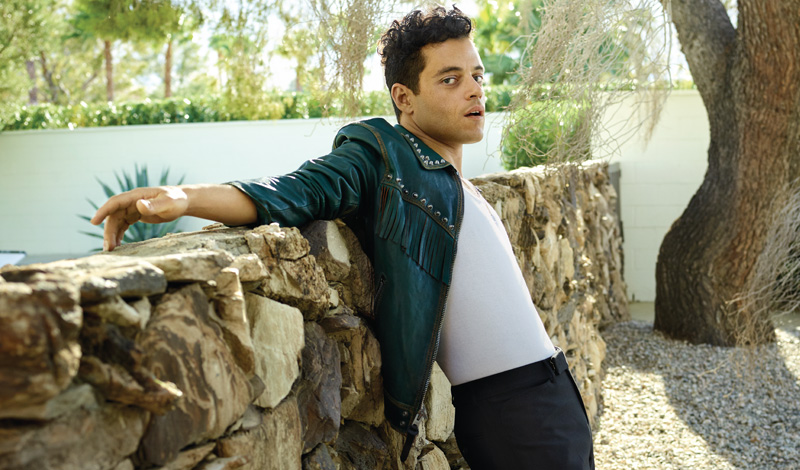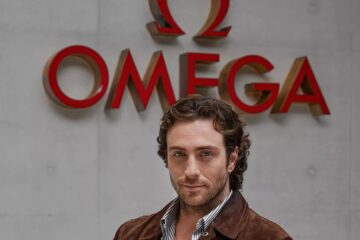Rami Malek: After The Oscars
Some stars wait nearly their entire career to take home a coveted Academy Award, but Rami Malek’s recent, somewhat surprise win at February’s ceremony is yet more proof — if needed — that the unending self-belief that has taken him from a falafel stand to the silver screen can get him to wherever he wants to go.
WRITTEN BY JAN JANSSEN
After capturing the Best Actor Oscar for his mesmerizing performance as Freddie Mercury in Bohemian Rhapsody, Rami Malek experienced emotions ranging from profound gratitude to astonishment. Having struggled earlier in his 20s to pay off his student loans, momentarily trading dreams of a Hollywood career for delivering pizzas and preparing falafel sandwiches at fast-food restaurants in Los Angeles, Malek, the American son of Egyptian immigrants, is now reaping the rewards for his determination and self-belief.
There may have been some in the industry who were equally astonished by Malek’s Oscar win. He was in a crowded field of undeniable acting heavyweights, after all, from the multifaceted Viggo Mortensen to the all-singing, all-Glastonbury Festival–playing Bradley Cooper and even Christian Bale himself, who many pinned as the award’s rightful spot for his captivating, chameleonic turn as Dick Cheney in Vice. Befitting of his left-field status in the race for the Oscar, Malek still admits even now, having seen off all-comers to that golden statuette, that he carries a fair amount of trepidation over the consequences such a famous success can bring.
“There are aspects of it that will take some getting used to that I don’t know if I’ll ever get used to,” the 37-year-old says. “I appreciate a certain sense of solitude and anonymity that I’m going to try my darndest to hang on to. This will probably make it a little more difficult.”
That desire for privacy may well get harder to implement, given both Malek’s new-found standing in the pantheon of acting greats, as well as his brand-new Hollywood relationship with Bohemian Rhapsody co-star Lucy Boynton. It wasn’t until early January, after months of tabloid speculation, that Malek openly acknowledged the pair’s relationship with a heartfelt comment at the Palm Springs International Film Festival, where he accepted the Breakthrough Performance Award. “Thank you, Lucy Boynton,” he said. “You have been my ally, my confidant, my love. Thank you so much.”
“When I work, I throw myself into the process in a deep way, and I tend to cut myself off from the rest of the world”
Such earnestness is typical of Malek, and he is equally forthright in his appraisal of what challenges an Oscar win could bring to his long-honed technique, especially in an era where greater recognizability on-screen more often than not leads to copious snapshots and selfies with fans on the street.
“I think my only real worry is that I might lose some of the darker and lonely sides of the kind of life I’ve been used to,” he admits. “When I work, I throw myself into the process in a deep way, and I tend to cut myself off from the rest of the world. I deliberately isolate myself, and I want to be careful not to lose that feeling because a lot of that gets incorporated into my work.”
That being said, there’s something in the manner of this slightly built star that hints at an inner steeliness and a wilfulness to do things his own way in spite of the glitz and glamour of the industry. This could be a product of his career so far, where the relative earliness of his ascent to the summit of awards season lies in direct contradiction to the lengthy nature of his attempts at securing high-profile roles.
Born and raised in Los Angeles, Malek went on to graduate from the University of Evansville in Indiana with a theatre degree in 2003. He then returned to his home city, but he struggled to land anything other than minor roles. His first part came in an episode of hit mother-daughter sitcom Gilmore Girls in 2004. After playing in several episodes of 24 and The Pacific TV miniseries in 2010, his big break came when he was cast as the lead in Mr. Robot a half-decade later, playing Elliot, a morphine-addicted cyber-security engineer and vigilante hacker. Though it had been a long road to Mr. Robot, Malek showed his untapped potential for great things when trusted with a leading role: he won an Emmy for the role in 2016, and he is currently completing work on season 4 of the acclaimed series.
“Everything has been such a slow burn for me in terms of the work I’ve been doing,” he nods. “I performed in my first play when I was 14, and my first paid acting job came when I was 22. It’s been mainly a long, slow grind to get to where I am now. I think if I were going to lose my sense of balance and get caught up in my success, it would have already happened by now,” says Malek.
“I still have very strong memories of stuffing envelopes with my headshot and resumé, and delivering them everywhere in Hollywood. It was a lot of little steps to get here; even when I landed the Mr. Robot role, I was still so thankful that I had succeeded in becoming a working actor. Getting to where I am now, it feels like the most incredible achievement. I still pinch myself thinking about being here.”
It’s interesting that, given Malek’s own introverted tendencies and frank admissions about coming to terms with his current success, the star would finally realize his dream playing one of show business’s most legendary extroverted characters: Freddie Mercury. The production of Bohemian Rhapsody got off to a rocky start, with comic mastermind Sacha Baron Cohen slated to take the lead role before abruptly leaving over “creative differences” with producers and Mercury’s former bandmates Roger Taylor and Brian May. In Malek, May and Taylor found a steady hand to guide the biopic, and in Mercury Malek found the perfect vessel to give the performance of his life on-screen.
He spent several months working with dialect, dance and singing coaches in order to transform himself into the beloved rock idol who died of AIDS in 1991. He wasn’t quite ready to belt out the songs himself — “no one would want to hear me sing,” quips Malek — with Quebec singer Marc Martel contributing vocals, instead, alongside original tracks from Mercury. But their sonic differences aside, Malek found much in the late music icon with which he could empathize.
“I identified with Freddie Mercury because, like him, I come from an immigrant family, and at home my parents spoke Arabic,” he explains. “Just as Freddie had trouble figuring out his identity and sense of place [in] his world, I also struggled with my own identity issues,” confirms Malek.
“There is something very particular about being a first-generation American or a first-generation Englishman, in the case of Freddie.
It’s a situation where your parents have left their homeland in search of a better life for their children, and naturally, they want you to lead steady lives and have a stable income as doctors or lawyers. That was my way of understanding Freddie because we both defied our parents by becoming artists, and I think the producers appreciated that quality about me.”
“It was important to me to explore the man behind the rock star and not just imitate his way of posing, his stage theatrics and his facial expressions. I wanted to get into the essence of Freddie Mercury”
Indeed, the combination of Taylor, May and the film’s cinema backing felt Malek was such a good fit for the part that “they were basically telling me at our first meeting that the role was mine if I wanted it.” In typical fashion, however, that was the easiest part of the process, with Malek then diving into the incredible world and legacy of Freddie Mercury.
“It didn’t really register with me at the time,” he says of the producers’ faith in his talents. “But as soon as they confirmed that I was going to play Freddie, I went online and basically studied every piece of video footage there was of him and Queen,” says Malek.
“I think I watched a few thousand hours of Queen concert footage, and I read every book and every magazine article I could find about him. I only had a few months to prepare, and so I felt this pressure to cram everything I could learn about him as quickly as possible.”
Looking back now, Malek may well be one of the world’s foremost authorities on the Queen frontman, given his months of careful preparation. Though much was made in the run-up to the Oscars about Bale’s physical transformation for Vice, with the star continuing in his typical dedicated vein by putting on more than 18 kilograms (40 pounds), Malek’s Mercury may have been a subtler turn, but one that came from a place of no less enthusiasm or professional diligence.
“It was important to me to explore the man behind the rock star and not just imitate his way of posing, his stage theatrics and his facial expressions,” Malek says. “I wanted to get into the essence of Freddie Mercury and his very defiant and almost revolutionary attitude toward life,” he says.
“I think he was looking for acceptance, and he had a powerful desire to connect with audiences. He grew up in Zanzibar and then attended a boarding school in India before his parents immigrated to London. He felt very out of place living in England at first, kind of a social outcast, and music and performing on-stage offered him this chance to draw people toward him and appreciate him because he had such a difficult time fitting in in his everyday life.”
Given the polar-opposite sentiment offered by Malek to the film’s first-choice lead Baron Cohen, one can’t help but wonder how different a film Bohemian Rhapsody could have been.
Regardless of its star, however, there was sure to be controversy over the biopic, given Mercury’s legendary status among musicians, pop-culture icons and the LGBTQ community of which he was a part.
There were some who even laid accusations that the film ignored Mercury’s sexuality at Bohemian Rhapsody’s door. For Malek, there’s a sense that greater success will always lead in some fashion to greater scrutiny. Even so, he’s keen to bring across to skeptical audience members that he was an advocate in support for the film encompassing a greater part of Mercury’s famous (or infamous) personal life.
“I would have loved to have been able to have shown more of Freddie’s relationship with other men and especially with Jim Hutton, whom he met in the latter part of his life,” he reveals. “I argued in favour of that, and I would have preferred that we paid more attention to that aspect of his life,” says Malek.
“I understand that criticism, and we had many, many discussions about how much of his sexuality and his hedonistic sides we were going to explore. He was a gay icon, and we were all aware of that, but there were considerations about reaching a broad audience and especially younger generations who aren’t as familiar with Freddie Mercury as older generations of Queen fans. And we also had only two hours to be able to tell his whole story.”
In scooping the Oscar, Malek has joined a long list of established names who reached their career zenith off the back of a biopic. From Ben Kingsley’s Gandhi to Philip Seymour Hoffman’s Truman Capote and Jamie Foxx’s portrayal of Ray Charles, the Academy Award for Best Actor has long been a stomping ground for stars willing to take on the task of bringing a real-life legend to the screen.
Given the media obsession with Mercury throughout his life — in particular, in his home nation of England — there’s an argument to be made that Malek, above all, was taking on a figure who many people thought they knew inside and out already.
“I wanted people to see his more fragile and introverted self, as well as his more raucous sides,” he explains. “There was a sense of mischief to him. He could be very witty and charming in interviews, and of course, I don’t think it would surprise people who watched his performances that he could also be very naughty and outrageous in his private life,” notes Malek.
“We tried to portray that in the film, but we also wanted to pay tribute to his musicianship and sides of him that aren’t so well-known and not just play up the debauchery.”
As for the star himself, there’s little chance of debauchery, even if, on his current trajectory as Hollywood’s golden boy, Malek looks set to be flying high in cinema over the next few years. He is returning to the set of Mr. Robot as an Academy Award winner, and there’s sure to be greater interest in [his] life both on- and off-screen. Especially, if rumours are to be believed, if Malek is awarded yet another spot in cinematic history as the villain in the Antoine Fuqua–directed, as-yet-unnamed 25th instalment of the James Bond franchise, set for release next year.
Little is known for sure about the project so far, with a proposed title floated online being denied by producer Barbara Broccoli just recently. Were he to end up facing off against the superspy, in what may well be current 007 incumbent Daniel Craig’s last feature, Malek will be following in the footsteps of a group of actors arguably no less impressive than the one he recently joined. A starring role in a Bond film would certainly secure his acting future — even if his hope for a private life may be challenged further by such a stratospheric role — but it’s no less than Malek deserves for his decade-and-a-half-long show of talent and determination on his way to the summit of cinema.
“I think something was possibly burning inside me, and that I had high aspirations of being able to live that dream,” he smiles. “And I’m getting a chance to do that right now at this very moment.”

























































































No Comment